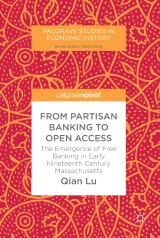Details

From Partisan Banking to Open Access
The Emergence of Free Banking in Early Nineteenth Century MassachusettsPalgrave Studies in Economic History
|
53,49 € |
|
| Verlag: | Palgrave Pivot |
| Format: | |
| Veröffentl.: | 09.10.2017 |
| ISBN/EAN: | 9783319676456 |
| Sprache: | englisch |
Dieses eBook enthält ein Wasserzeichen.
Beschreibungen
<p>How did banking in early nineteenth-century Massachusetts evolve? Lu provides a compelling narrative about the connection between inclusive political systems and open access economies, hypothesizing that entry into banking was firstly made upon partisan grounds before later becoming open access/free entry. Lu investigates state level institutional change and studies the transition to open access from an economic perspective. What was the relationship between banking and political elites? Why were elites, who enjoyed privileges under dominant institutions, willing to dissolve these institutions and eliminate their privileges? The author provides new insights into American economic history, explaining how a society moves from limited access to one of openness.</p>
<p>Chapter 1: Was the U.S. Born Modern?.- Chapter 2: The History of Partisan Banking.- Chapter 3: Empirical Studies on Bankers, Legislators, and Political Parties, 1790–1859.- Chapter 4: Empirical Studies on Political Connection of Suffolk Legislators, 1790–1859.- Chapter 5: Empirical Studies on Bankers’ Wealth and Bank Balance Sheets.- Chapter 6: An Intra-Elite Explanation of Open Access.- Chapter 7: Conclusion: Democracy, Civil Society, Elites, and Impersonal Rules.</p>
<p>Qian Lu is Assistant Professor at the School of Economics, Central University of Finance and Economics in Beijing, China.</p>
<p>How did banking in early nineteenth-century Massachusetts evolve? Lu provides a compelling narrative about the connection between inclusive political systems and open access economies, hypothesizing that entry into banking was firstly made upon partisan grounds before later becoming open access/free entry. Lu investigates state level institutional change and studies the transition to open access from an economic perspective. What was the relationship between banking and political elites? Why were elites, who enjoyed privileges under dominant institutions, willing to dissolve these institutions and eliminate their privileges? The author provides new insights into American economic history, explaining how a society moves from limited access to one of openness.<br/></p>
Explores how the USA evolved into a modern society in the sense of impersonal rules and open access of organizations Argues that the USA was not born modern in the sense of competitive economy and polity, shown by early nineteenth-century banking Provides an explanation of open access banking based on the conceptual framework of intra-elite competition Includes supplementary material: sn.pub/extras
Explores how the USA evolved into a modern society in the sense of impersonal rules and open access of organizations<div>Argues that the USA was not born modern in the sense of competitive economy and polity, shown by early nineteenth-century banking</div><div>Provides an explanation of open access banking based on the conceptual framework of intra-elite competition<br/></div>
Diese Produkte könnten Sie auch interessieren:

Supply Chain Management: Models, Applications, and Research Directions

von: Joseph Geunes, Panos M. Pardalos, H. Edwin Romeijn

149,79 €















